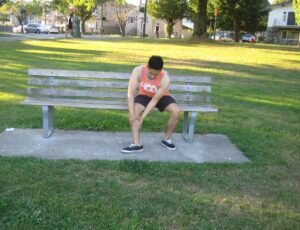Gastrocnemius Tendinopathy: Calf Pain and Knee Injury Awareness
Gastrocnemius tendinopathy is an overuse injury that affects the tendon of the calf muscle, often causing pain behind the knee or in the upper calf. This condition is commonly seen in runners, athletes, and individuals whose work or recreation involves repeated walking, lifting, or sudden bursts of movement.
The gastrocnemius is a powerful calf muscle that helps propel the body forward during walking, running, and climbing. When the tendon is repeatedly stressed without adequate recovery, it can become irritated or gradually weakened, leading to pain and reduced function.
Common Signs and Symptoms

Symptoms of gastrocnemius tendinopathy usually develop gradually and may include:
- Pain behind the knee or upper calf that worsens with activity
- Tenderness where the calf muscle connects near the knee
- Discomfort when bending the knee against resistance
- Pain during calf raises, especially with the leg kept straight
- Stiffness or tightness in the calf, particularly after rest
Pain may feel mild at first but often increases if activity continues without rest.
Why Gastrocnemius Tendinopathy Occurs
This injury is most often linked to overuse, especially when physical demands increase too quickly. Common contributing factors include:
- Sudden increases in running distance or intensity
- Frequent sprinting or uphill activity
- Poor footwear or worn-out shoes
- Limited flexibility or strength imbalance in the hips, knees, or ankles
- Inadequate recovery between training sessions
In Canadian climates, cold weather can also contribute to muscle tightness, increasing strain on the calf if proper warm-up is skipped.
First Aid and Injury Management Awareness
Early recognition and basic first aid awareness can help reduce complications and downtime. Initial care commonly focuses on protecting the injured area and limiting further strain.
Key first aid principles include:
- Rest: Avoid activities that trigger pain
- Cold application: Helps reduce pain and inflammation in early stages
- Compression and elevation: May assist with swelling control
- Activity modification: Low-impact options such as cycling may be tolerated
As symptoms improve, gradual stretching and strengthening are often introduced under professional guidance to reduce the risk of recurrence.
When to Seek Medical Assessment
Medical evaluation is recommended if:
- Pain persists despite rest and activity modification
- Walking or work duties become difficult
- Swelling or weakness worsens
- Pain interferes with daily function or safety
Understanding when an injury needs professional attention is a key part of first aid and workplace safety training.
Why First Aid Training Matters
Muscle and tendon injuries are common in workplaces, sports, and everyday activities across Canada. First aid training, including in St Mark James Training advanced and intermediate first aid classes, helps individuals recognize injury patterns, apply appropriate early care, and make informed decisions about when to seek medical help.
Courses that include injury awareness support safer responses at work, at home, and during recreational activities.
Educational Disclaimer
This content is for educational purposes only and does not replace professional medical advice. To build confidence in recognizing and responding to musculoskeletal injuries, consider enrolling in first aid and CPR training through an accredited Canadian training provider.
